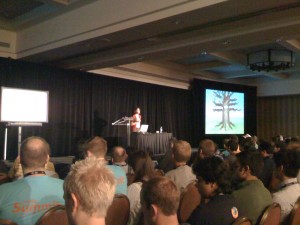
Last half a year was amazing for me. I joined Mozilla Corp., reignited my participation in Mozilla project, worked on several exciting projects and it’s an amazing coincident that this half a year is almost over exactly now, when I’m sitting at Whistler, with 400 creative, innovative people and we’re all listening to Mitchell Baker speaking about our open source roots, and the trunk of the project being about “Human interaction with the Internet”… It’s thrilling.
There are several projects that I’m trying to launch related to Mozilla, I will be speaking about them during the Firefox Summit, and I will blog about it once the summit people share their feedback on it.
One of the elements of Mozilla ecosystem that has been super exciting for me is localization and internationalization. And the great news is that there’s a lot happening around L10n in Mozilla these days. We’re improving the l10n build system, l10n processes, but there’s one very visibly missing area in L10n land – tools. We finally have a project that is going to target this – Verbatim. Verbatim is a project aiming for a webtool that will allow localizers focus on the translation instead of having to spend time trying to figure out how to do the actual translation. If you’re in Whistler, we have a presentation on Verbatim today 🙂
But that’s not all! There is one project that was something I’ve been coding over weekends and while at the airports and on flights and in many other places. It’s inspiring and challenging for me enough to keep working on it over evenings, nights, sundays, and holidays which I have to apologize for to my girlfriend 🙁
Yesterday, I tagged stage2 of the project which means it’s more or less ready to go public and be reviewed by you all, and has a chance to explain itself to the level that may attract others to join me and participate in it.
The project name is Silme, and it is a python localization library that has been structured in a multi-abstract level model. Thanks to it, the library works natively with DTD, Properties, GetText, can work with XLIFF, L20n, ini files and any other l10n data format. Beside, it can work with files stored on drive, in SVN, in CVS, in MySQL, SQLite and virtually any other data source.
On the other hand it’s extensible and flexible enough to work in web app, command line tools, or GUI tools. It’s not only for Mozilla, as any other project can build apps on top of this library. Be it Songbird, Miro, Seamonkey, Firefox, Thunderbird, Addons.mozilla.org, Flock, GNOME, KDE, etc., etc.
If you find above description interesting, please read the original announcement and join the project. It’s totally open and very alpha. If I try to express where I am with it, I think I just passed the mark when the code self explains the idea. Nothing more.
Beside, it’s a lib. Unless people like to localize directly in python env, we need apps on top of it. And it’s at least as challenging as a library itself, but if you want to write a localization app, I think it’ll be easier if you will be able to focus on UI and features of the app, and minimize the work on sole entity operations that Silme does cover.
So… here we are. I’m confident I will keep working on it, and some small simple apps will be created for my own use, but it’s very, very far from being useful, and need a lot of work to get there. Ultimate goal will be to work smoothly with an exciting project that is being mindcrafted in Mozilla these days – L20n.
Please, remember that it’s a hobby library for now, a product of several years of work as localizer, countless nights spent with my friends from Aviary.pl – Polish Localization Team, and the creative environment of Mozilla project. It’s up to you all what will happen next with it 🙂 So mail me, or reach me on IRC if you want to discuss things about possibilities that Silme opens!